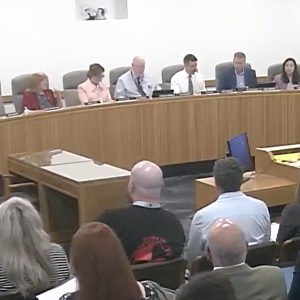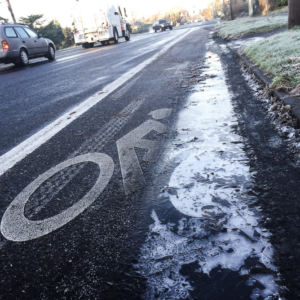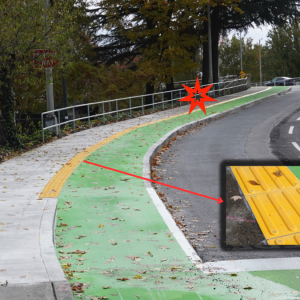Tale of Two Taxes: The bicycle tax and taxing transportation system.
The Bike Industry leaders in the May 15th BikePDX article state an excellent articulation of the troubles with taxing a single mode. Earlier this month a comment was made about taxing the ADA modes of wheel chairs & personal mobility devices as bringing intersections into ADA compliance is expensive. Taxing waffle material on sneakers could sarcastically satisfy the madness of Trump to balance tariffs in making pedestrians pay for Walk lights and stripe-ings and street calming measures. These, of course, are a snarky revelation that taxing a mode share can be a ridiculous paradigm.
But perhaps we need to chess move ahead. One of the programs that was successful in England was allowing companies to buy bicycles for their employees. The company could write off the bicycle costs as a company expense. The employee was then allowed to buy the bicycle from the company with specific employment guidelines (e.g. duration of employment). The employee could use pretax payroll dollars to purchase the bicycle. This boosted the use of bicycles tremendously during the ‘programme.’ This could be a simple amendment attached to the transportation bill which supports a positive active transportation scheme. Using honey to reduce cars on the road might be a bigger benefit than the 2 million potential dollars income from taxing bicycles. We need a legislator to write an amendment.
Associated with this concept is also a bicycle tax credit for those individuals who do not own a car and have purchased a new bicycle for the primary transportation. This would be easy to check through Oregon DMV. Again, to echo all the dealers: we need to promote efficient, health maintaining, sustainable modes of transportation. We need a legislator to write an amendment.
I spent a frustrating decade of the 2000s talking with legislative people who kept telling me that they receive more calls from angry citizens that bicycles don’t pay their way than they did from citizens who want bicycle infrastructure. The old BTA produced two great position papers in those days to show how people who ride bicycles do pay for road transportation in many ways. Our anemic sector participation in government of the last decades has come to roost in many ways. I ~sometimes late at night~ felt ‘let them tax us- get this off the table so we can have substantial development of infrastructure instead of millimeter steps. In those days, it was a turncoat’s idea to acquiesce to paying tax on bicycles. And there still is an vague sense that there is a potential quid pro quo of ODOT saying, well you only raised 2 million in taxes and that’s all you get for active transportation. We are still having this partisan, polarizing conversation as car drivers get to stare at each other at slower congested speeds and bicycles get to whiz by them at healthy speeds.
It is also frustrating that cars represent half of all the 3 mile trips. It is frustrating that the ODOT’s Orego system of taxing miles used instead of gas consumed gets such a bad rap. The Orego system as presented in our Oregon’s sustainability meetings in 2008 has the potential of taxing congestion. This is because the system knows exactly where and when you are on a congested highway and time period. No different than the iphone’s Find Friends. Literally, the tax could be applied where and when congestion occurred. For example, if you entered I-84 at 181st street and came into downtown, that precise route by the vehicle is recorded & could be charged a congestion rate from 730 to 930 AM. The structure is there. This is much less programming than the algorithms of driverless vehicles proceeding along I-84 during congested highway times. There was no political will to forecast this as a solution. ODOT and legislators cowered then and now.
Thinking that bicycling is taxing our transportation system costs and a bicycle tax is part of a bill that attempts to ameliorate congestion makes me mad. The child in me wants to strike/protest and really show how the absence of bicycles would tax the system. One idea that Lenny Anderson and I had separately was to have an All Car Day in Portland. Organize all those who bicycle to work crossing the bridges to get up early (530-600 AM) and occupy all the parking spaces with cars. Park in all the spaces on the street. Park in all the garages. Have a simple sign on each car stating “This car was a bicycle yesterday.” Imagine the 14,000 bikes coming into downtown Portland being a car instead. What a reality check for those complaining about congestion. Cars tax the system, not bicycles. ~AJZ







Thanks for reading.
BikePortland has served this community with independent community journalism since 2005. We rely on subscriptions from readers like you to survive. Your financial support is vital in keeping this valuable resource alive and well.
Please subscribe today to strengthen and expand our work.
Yep.
Great post! I often read UK-based bike sites, and I’m a bit envious whenever they mention their “Cycle to Work scheme”. It really does seem like a great program. The fact that they get to spend up to 1,000 pounds on a bike means they don’t have to just settle for a cheap department store bike that could end up costing more than it’s worth in maintenance/repairs.
I like the idea of the “All Car day” too, could really open some eyes as to how much cyclists actually benefit drivers. Though, I’m sure there would still be some that would just try to use it as evidence of needing more roads and parking infrastructure built.
As I once testified at City Council regarding motorists dismay at funding bike facilities…”I can be on my bike BESIDE you in the bike lane, or I can be in my car IN FRONT of you in the regular motorized lane. Take your pick!”
AJ is dead on…the cheapest way to reduce congestion is to encourage more folks to leave their cars at home at bike, walk or take transit. Its not even close.
Re the all-car day: If a cyclist woke up one fine day to find ten times as many bikes on the road, s/he would be ecstatic and spend the day with a big smile. If motorists woke up one day to find ten times as many cars on the road, they wouldn’t be smiling.
In the long run, we’re going to have many more people around here. There’s just no way to make it all work and keep any sanity if we continue to have such high rates of motor vehicle use. The sooner our legislators recognize this and stop discouraging active transportation the better off we’ll all be.
B. Carfree, another angle to what you’ve said is “pick whose neighborhood you want torn down to increase road space.” Betcha that wouldn’t go over too well either.
In the high traffic density urban and suburban areas are the only places in the state where, from a congestion standpoint, use of bikes instead of motor vehicles, should be generally thought of by the public, though it somehow continues not to be…as an important mode of transportation to be gladly supported by the general public.
That is, in order to help keep pace with the travel needs of a growing public without further crippling the road and street system’s ability to meet the public’s daily travel needs.
In the rural areas of the state, most of which has low population density and probably very little traffic congestion, driving everywhere is easy and the logical way to get around.
Political leaders, community and transportation visionaries, bike advocates, and just people in general, don’t think about and talk about enough, just how increasingly important is better infrastructure that enables more peoples daily travel needs to be met by simply walking and biking, if they’re physically able to do so, and ideally, if they want to rather than have to.
To be feasible for meeting people’s daily travel needs by walking and biking, that infrastructure will have to consist of more than than only the directly adjoining to main lane, bike lanes that have been the standard in our state for decades. To date, there is no visionary plan presented to the public, available for the public to come to know well, that would successfully sell people on an objective that would win their widespread support.
In short, this proposed bike tax being passed around in legislature at present, is I think, essentially a waste of time. The intent to try extract money directly associated with bikes as vehicles, the least space occupying of all vehicles on the road, by both the percent of road users using them, and the sheer physical size of bikes compared to almost all motor vehicles on the road…polarizes people against each other, and misses the main objective that must be kept in mind.
Infrastructure availability for use of the road with motor vehicles in urban and suburban areas has largely reached its peak. Society can effectively get more use out of the existing miles of street and roads, if they’re being used with bikes rather than generally much larger motor vehicles. The public has to be able to recognize that it’s the public’s, rather than simply people that bike…responsibility to double up and provide that infrastructure asap.